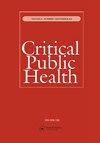俄罗斯临床环境中的循证医学和医生机构
IF 2.3
3区 医学
Q2 PUBLIC, ENVIRONMENTAL & OCCUPATIONAL HEALTH
引用次数: 0
摘要
摘要20世纪90年代的俄罗斯,国际化浪潮为俄罗斯医疗带来了循证医学范式。虽然对采用这种模式进行医疗决策的后果有相当多的批评性评论,但其中大部分与欧洲、北美和澳大拉西亚的具体情况有关,很少有针对后苏联临床实践的研究。本文通过对俄罗斯医生的半结构化定性访谈,探讨了在该国引入循证医学与后社会主义医学专业化转型之间的纠葛。我指出,医生们努力调和循证医学范式与组织约束,这表明了专业人员的基层代理。我定义了该机构的以下组成部分:(1)选择性应用指南和使用外国临床建议;(2) 建立地方职业团结;(3) 与患者建立基于个性化信任的关系。该研究采用了两组数据(2018年和2020年收集)来追踪新冠肺炎大流行之前和期间医疗专业人员的EBM相关机构。这篇文章通过提供后社会主义医疗保健的分析见解,为医学专业人员在循证医学相关标准化时代的自主权和代理权的学术辩论做出了贡献。本文章由计算机程序翻译,如有差异,请以英文原文为准。
Evidence-based medicine and physicians’ institutional agency in Russian clinical settings
ABSTRACT In 1990s’ Russia, a wave of internationalization brought an evidence-based medical paradigm to Russian healthcare. Whilst there has been considerable critical commentary on the consequences of adopting this paradigm for medical decision-making, much of this relates to specific contexts in Europe, north America and Australasia, with little research addressing post-Soviet clinical practice. Drawing on semi-structured qualitative interviews with Russian physicians, this article explores the entanglements between the introduction of evidence-based medicine (EBM) in the country and the transformation of post-socialist medical professionalism. I single out physicians’ efforts to reconcile the EBM paradigm with organizational constraints as indicative of professionals’ ground-level agency. I define the following components of such agency: (1) selective application of guidelines and use of foreign clinical recommendations; (2) establishing local professional solidarity; (3) developing relationships based on personalized trust with the patients. The study employs two sets of data (gathered in 2018 and in 2020) to trace the EBM-related agency of medical professionals both before and during COVID-19 pandemic. By offering analytical insights from post-socialist healthcare, where doctors’ discretion has historically been limited by excessive state control, the article contributes to academic debate on medical professionals’ autonomy and agency in the era of EBM-related standardization.
求助全文
通过发布文献求助,成功后即可免费获取论文全文。
去求助
来源期刊

Critical Public Health
Multiple-
CiteScore
5.90
自引率
7.10%
发文量
36
期刊介绍:
Critical Public Health (CPH) is a respected peer-review journal for researchers and practitioners working in public health, health promotion and related fields. It brings together international scholarship to provide critical analyses of theory and practice, reviews of literature and explorations of new ways of working. The journal publishes high quality work that is open and critical in perspective and which reports on current research and debates in the field. CPH encourages an interdisciplinary focus and features innovative analyses. It is committed to exploring and debating issues of equity and social justice; in particular, issues of sexism, racism and other forms of oppression.
 求助内容:
求助内容: 应助结果提醒方式:
应助结果提醒方式:


